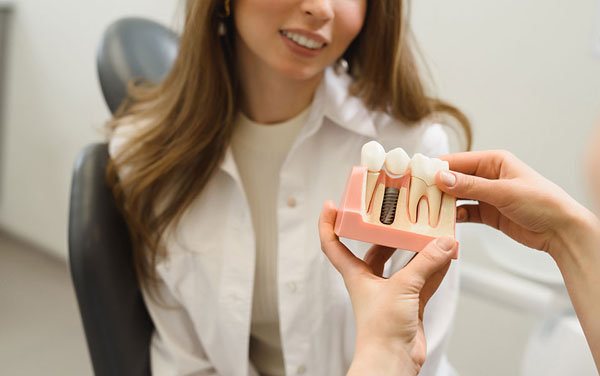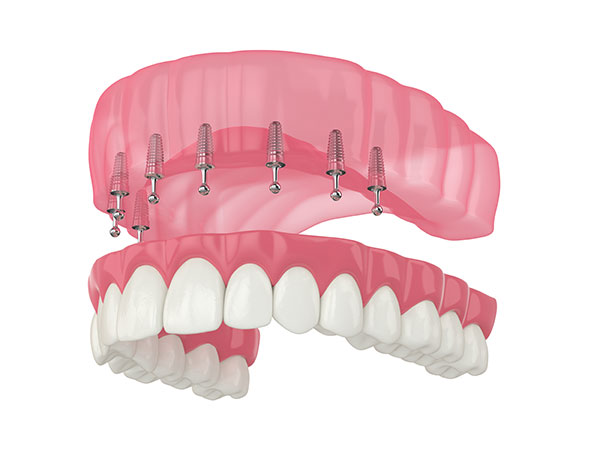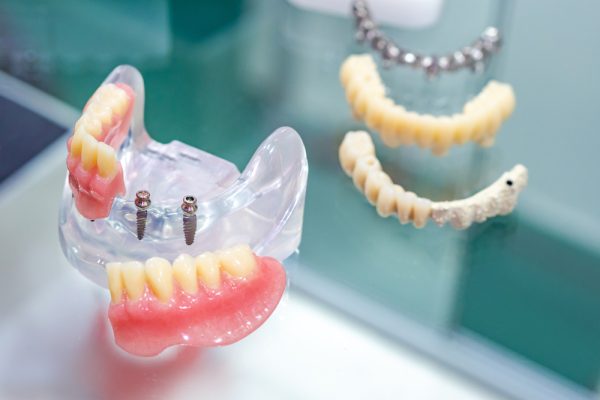Looking to Restore Your Smile With Dental Implants?
If you’re missing one or more teeth, you’re not alone. Millions of people around the world face this challenge, which can have a significant impact on their oral health, confidence, and quality of life. Dental implants offer a reliable and long-lasting solution for restoring your smile and bite function, but you might be wondering which one is right for you.
Dr. Scott Grivas, a leading Sacramento, CA, implant dentist, is skilled in providing exceptional dental implant treatments and can help his patients learn more about implants and which ones might be right for them. If you’re considering dental implants, call (916) 929-9222 to schedule a consultation at our Sacramento dental practice.
Types of Dental Implants
Endosteal Implants
Endosteal implants are the most common type of dental implant. They consist of a titanium post surgically inserted into the jawbone, where it fuses with the bone over time.
Some of the advantages of endosteal implants include:
A secure and stable fit
- Long-lasting results
- The ability to preserve the integrity of the surrounding teeth
- Suitability for most patients with sufficient jawbone density
Disadvantages of endosteal implants may include:
- A longer healing process than other restorative measures
- Higher initial cost
Subperiosteal Implants
Subperiosteal implants are a type of dental implant placed on top of the jawbone rather than inserted into it. Subperiosteal implants are typically recommended for patients who have experienced significant bone loss and aren’t candidates for endosteal implants.
Some of the advantages of subperiosteal implants include:
- A shorter healing time
- The ability to be used in patients with insufficient jawbone density
Disadvantages may include:
- A higher risk of implant failure
- Potential discomfort
All-on-4 Implants
The All-on-4 implant technique involves placing four strategically positioned implants in the jawbone to support a full arch of replacement teeth. All-on-4 implants are suitable for patients who are missing all or most of their teeth and have sufficient jawbone density.
Advantages of All-on-4 dental implants include:
- A shorter treatment time
- Lower cost compared to traditional implants
- The ability to replace an entire arch of teeth with fewer implants.
Disadvantages may include:
- A higher risk of implant failure
- Potential discomfort.
Zygomatic Dental Implants
Zygomatic dental implants are a specialized type of implant designed for patients with severe bone loss in the upper jaw. Unlike traditional implants, zygomatic implants are anchored in the zygomatic bone (cheekbone) rather than the jawbone.
Some of the possible benefits of zygomatic dental implants include:
- Suitability for patients with insufficient bone in the upper jaw for regular implants
- Eliminate the need for bone grafting procedures
- Provide immediate function and tooth replacement in many cases
Possible disadvantages of zygomatic dental implants include:
- More complex and invasive surgical procedure
- Higher cost compared to traditional implants
- Increased risk of complications
Implant-Supported Dentures
Implant-supported dentures, also known as overdentures, are a type of prosthetic restoration that combines dental implants with removable dentures. The implants are strategically placed in the jawbone to provide a secure and stable foundation for the dentures.
Some of the advantages of implant-supported dentures include:
- Stability and retention compared to traditional dentures
- Increased biting and chewing ability
- Preserving jawbone density and preventing further bone loss
- A more cost-effective alternative to fixed implant-supported bridges
Possible disadvantages of implant-supported include:
- Requires sufficient jawbone density for implant placement
- Longer treatment process compared to traditional dentures
- Higher initial cost than conventional dentures
Implant-Supported Bridges
Implant-supported bridges are a type of dental restoration that uses dental implants to support a fixed bridge of replacement teeth. The implants act as artificial tooth roots, providing a secure and stable foundation for the bridge. Implant-supported bridges are an excellent option for patients who are missing multiple teeth and desire a permanent, fixed solution that looks and feels like natural teeth.
Some of the advantages of implant-supported bridges include:
- Permanent and non-removable solution
- Natural appearance and function similar to natural teeth
- Preserves the integrity of the surrounding teeth
- Long-lasting and durable with proper care
Possible disadvantages of implant-supported bridges include:
- Requires sufficient jawbone density for implant placement
- Higher initial cost compared to traditional bridges
- Longer treatment process involving multiple procedures
Mini Dental Implants
Mini dental implants are a smaller and narrower version of traditional dental implants. They’re designed to be used in areas with limited bone density or space, making them a suitable option for patients who may not be candidates for regular implants.
Some of the advantages of mini-dental implants include:
- Minimally invasive placement procedure
- Shorter healing and recovery time
- Can be used in areas with limited bone density
- More cost-effective than traditional implants
Some of the disadvantages of mini dental implants include:
- Potentially less stable and durable than larger implants
- May not be suitable for supporting larger restorations
- Limited long-term data on their longevity
Factors to Consider When Choosing Dental Implants
- Bone Density and Jaw Structure: Sufficient bone density and jaw structure are essential for successful implant placement and long-term stability.
- Number of Missing Teeth: The number of missing teeth will determine whether you need a single implant, an implant-supported bridge, or a full-arch restoration.
- Overall Oral Health: Good oral health is crucial for the success of dental implants, as conditions like gum disease can increase the risk of implant failure.
- Cost and Budget: Dental implants can be a significant investment, so it’s essential to consider the upfront costs, as well as potential long-term savings compared to other tooth replacement options.
- Lifestyle and Preferences: Your lifestyle and personal preferences, such as your desire for a fixed or removable restoration, will play a role in determining the most suitable implant solution.
Find the Right Dental Implant Solution with Dr. Grivas, Call Today!
Choosing the right dental implant is crucial for long-lasting results, and Sacramento, CA, implant dentist Dr. Scott Grivas can help you make an informed decision based on your unique needs. With years of experience and a commitment to excellence, Dr. Grivas and his team provide personalized implant services, guiding you through every step for a comfortable and successful outcome.
Don’t let missing teeth hold you back any longer — call (916) 929-9222 to schedule your appointment and restore your beautiful, confident smile. Serving patients in Sacramento and surrounding areas such as La Riviera, West Sacramento, Florin, Rosemont, and beyond.





